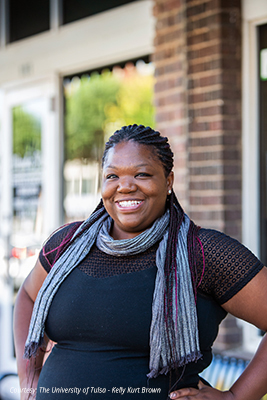Grambling State to host Dr. Alicia Odewale for Disney on the Yard and National Geographic Live event October 10
African Diaspora Archaeologist and National Geographic Explorer to share journey that influenced her aspirations to become a committed researcher and how education and mentorship paved her pathway

Courtesy: The University of Tulsa – Kelly Kurt Brown
Grambling, La. – October 6, 2022 – On Monday, October 10, Grambling State University (GSU) students will have an opportunity to hear and learn from African Diaspora Archaeologist Dr. Alicia Odewale. Presented in partnership with Disney on the Yard, the National Geographic Live event will be held at 10:00 a.m. in the School of Nursing auditorium on GSU’s campus.
Dr. Alicia Odewale is an archaeologist and an assistant professor of anthropology at The University of Tulsa. Her research and teaching focuses on archaeological sites of African heritage in St. Croix, U.S. Virgin Islands, and Oklahoma.
She is a dedicated researcher of the archaeology of enslavement and freedom in urban contexts, Caribbean archaeology, rural and urban comparative analyses, community-based archaeology, ceramic analysis, transferware studies, mapping historical trauma, and investigations into different forms of cultural resistance. Her latest research project seeks to reanalyze historical evidence from the 1921 Tulsa Race Massacre. This research has given Dr. Odewale the opportunity to launch new archaeological investigations in the historic Greenwood district of Tulsa, Oklahoma, and use a slow community-based approach to develop radical mapping techniques to visualize the impact of the massacre on the landscape of Greenwood through time.
A native of Tulsa, Oklahoma, archaeologist Dr. Odewale is uncovering stories of resilience in the hundred years since the attack on Black Wall Street in the historic Greenwood district. Considered one of the worst episodes of racial violence committed against Black people in American history, the Tulsa Race Massacre left a devastating toll on generations of survivors and their descendants and impacted the very footprint of the district itself.
As a National Geographic Explorer, Dr. Odewale has been re-examining historical and archaeological evidence in Tulsa—focusing not on the attack itself, but instead on the community’s trauma and triumph in its aftermath. In her project “Mapping Historical Trauma in Tulsa from 1921-2021,” she documented the personal stories of Greenwood’s residents and mapped the evidence of their resilience. Dr. Odewale’s work illuminates a new perspective on the impact of racism and racial violence in America through the lens of a community that continues to survive against all odds.

